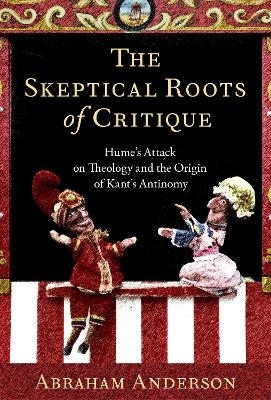
The Skeptical Roots of Critique
Oxford University Press Inc (Verlag)
978-0-19-768400-9 (ISBN)
- Noch nicht erschienen (ca. März 2025)
- Versandkostenfrei
- Auch auf Rechnung
- Artikel merken
In his Enquiry, Hume hints that both Samuel Clarke's theism and the dogmatic materialism he seeks to refute are underwritten by the rationalist causal principle that nothing comes from nothing, and that the clash between the two issues in a skeptical antithetic. In his Émile, Rousseau too saw Clarke's refutation as issuing in an antithetic. These works inspired the first version of Kant's Antinomy, the Dreams of a Spirit Seer; fifteen years later, Hume's Dialogues inspired the mature Antinomy of the Critique. Like Hume's Enquiry and Dialogues and Rousseau's Émile, the Critique is part of the battle for Enlightenment, the struggle against the 'despotic' reign of theological dogmatism.
Abraham Anderson is Professor of Philosophy at Sarah Lawrence College. He held graduate fellowships at the École normale supérieure (rue d'Ulm) and the University of Munich. He has also taught at the University of New Mexico, the Universidad Autónoma de México, St. John's College (Santa Fe) and the American University in Cairo. He is the author of The Treatise of the Three Impostors and the Problem of Enlightenment and of Kant, Hume, and the Interruption of Dogmatic Slumber.
Bibliographical Note
Preface
Acknowledgments
Introduction: The State of the Question
1. Awakening from Dogmatic Slumber: Sextus, Hume, and the Roots of Transcendental Idealism
2. The Impact of the Dialogues
3. Skeptical Method in the Discipline and the Antinomy: The Debt to the Dialogues
4. Rousseau, Hume, and the Dreams of a Spirit-Seer
5. The Logik Blomberg on Skeptical Method and Kant's Reading of the Enquiry
6. The Philosopher and the Common Understanding: Beattie vs. Hume, and the First Interruption of Dogmatic Slumber in the Antinomy
7.
| Erscheinungsdatum | 21.08.2024 |
|---|---|
| Verlagsort | New York |
| Sprache | englisch |
| Maße | 140 x 210 mm |
| Themenwelt | Geisteswissenschaften ► Philosophie ► Erkenntnistheorie / Wissenschaftstheorie |
| Geisteswissenschaften ► Philosophie ► Geschichte der Philosophie | |
| Geisteswissenschaften ► Philosophie ► Metaphysik / Ontologie | |
| Geisteswissenschaften ► Philosophie ► Philosophie der Neuzeit | |
| Sozialwissenschaften | |
| ISBN-10 | 0-19-768400-9 / 0197684009 |
| ISBN-13 | 978-0-19-768400-9 / 9780197684009 |
| Zustand | Neuware |
| Informationen gemäß Produktsicherheitsverordnung (GPSR) | |
| Haben Sie eine Frage zum Produkt? |
aus dem Bereich

![Was heißt Denken?. Vorlesung Wintersemester 1951/52. [Was bedeutet das alles?] - Martin Heidegger](/media/113619842)
